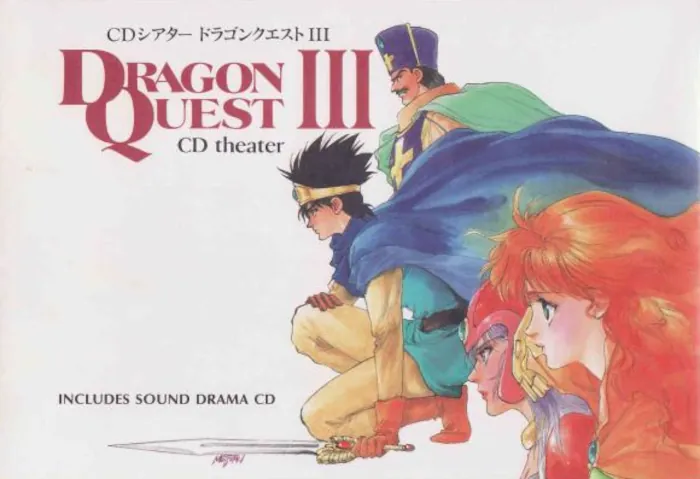It was over 15 years ago that I got my hands on the CD theater albums for Dragon Quest I and Dragon Quest II. I knew precious little about drama CDs back then, so I don’t think I totally understood that what I had in my hands was special. Not only did these “CD theater” albums come with beautiful artbooks, but they included newly-arranged music by Koichi Sugiyama’s de facto protégé, Hayato Matsuo. Sadly, you will never find this music isolated outside of the dialogue and sound effects of these drama CDs, though some tracks on these albums do offer unmitigated sections of music, particularly in the first and last tracks of each album. Nonetheless, as a poor monolingual English-speaker, I almost wish someone would “fansub” these drama albums so I could read in English what I’m hearing in Japanese.
Dragon Quest III‘s CD theater album is unique in that it is the only two-disc collection. Later series entries were separated into volumes, complete with their own artbooks, and released on different dates. But ECD-003~4 is the only time Enix did a multi-disc CD theater release.
If you look at the tracklist, and you’ve played any incarnation of DQIII, you’ll recognize the names of people, places, and enchanted objects galore. As the end of the Roto/Erdrick trilogy, Dragon Quest III is packed with more story, and more emotion, than the previous two titles combined. It also has a legendary soundtrack, particularly in its dungeon music (see “Hidden Cave”) and in the memorable East Asian music (see “Jipang”). It also has the wonderful end credits/subtitle music “And Then Into Legend…,” which is always a winner.
As with most of the CD theater albums, the battle sequences tend to be a little too heavy with sound effects and people screaming: the flustered hero, the screaming girl, the roar of a monstrous entity. “Baramos” and “Ruler of Darkness” are chief offenders here. In some ways, it’s very upsetting for me that these tracks mix the voice and sound effects so high that the music is almost drowned out, because Matsuo’s arrangements of the battle music are, in my opinion, better than both the symphonic suite versions and the original Famicom counterparts. But we never get a clear listen to it, so it’s hard to really enjoy it for all its worth.
If I spoke fluent Japanese, I think I would truly treasure this collection, perhaps more than the others. Having 140 minutes of audio and a beautiful artbook dedicated to one of the most memorable entries in the DQ series is great, but if you can’t enjoy most of the audio because it sounds like gibberish… it still makes for a nice collector’s item, but not-so-nice for regular listening.




